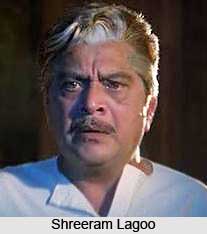 Dr. Shreeram Lagoo is a trained ear, nose, and throat surgeon and also very much interested to theatre. He was born in 1927. From his childhood only he was very much interested in theatre or acting. Lagoo was extremely talented. He participated in the amateur theatre movement in Pune in the mid-1950s. After that Shreeram Lagoo joined the Progressive Dramatic Association led by Bhalba Kelkar, which began by presenting old plays in new performance modes before moving on to experimental scripts.
Dr. Shreeram Lagoo is a trained ear, nose, and throat surgeon and also very much interested to theatre. He was born in 1927. From his childhood only he was very much interested in theatre or acting. Lagoo was extremely talented. He participated in the amateur theatre movement in Pune in the mid-1950s. After that Shreeram Lagoo joined the Progressive Dramatic Association led by Bhalba Kelkar, which began by presenting old plays in new performance modes before moving on to experimental scripts.
The play that challenged Lagoo`s acting abilities the most and brought him the greatest recognition was Vedyacheghar unhat i.e. `Madman`s House out in the Heat` in 1957, written by a new dramatist, Vasant Kanetkar. Here Lagoo found the modern sensibility to which he could relate. At the same time, he staged classics, directing and acting in Rajmukut i.e. `Raja`s Crown` in 1963. He also staged V. V. Shirwadkar`s adaptation of Shakespeare`s Macbeth. To his often-expressed regret, it was not a success. In later years, he turned director only when nobody else could be persuaded to direct plays that he felt had to be done. For example, he produced Vijay Tendulkar`s Gidhade i.e. `The Vultures` in 1970. It turned down by others because it broke too many taboos of middle-class theatre. Again, during the Emergency, he felt compelled to translate, direct, and produce Anouilh`s Antigone in 1976 under his own banner, Roopwedha. In instances such as G. P. Deshpande`s Uddhwasta dharmashala i.e. `Desolate Dharmashala` in 1974, he might have chosen to direct because he wished to play the main role. The years he had spent in London in connection with his profession gave him the chance to see Western theatre. This, along with his exposure to the work of film actors like Paul Muni, provided him with a sense of purpose as an actor. On his return, the leading group Rangayan invited him to perform in productions like Tendulkar`s Madi i.e. `Female` in 1963 and Mi jinkalo mi haralo i.e. `I Won, I Lost` in 1963. By this time his acting had evolved into the individual idiom associated with him. He cultivated a conscious and nuanced use of the lower register of his naturally resonant voice. He made a point of enunciating every word clearly. He concentrated almost exclusively on voice and facial expression to create a character. His book Vachik abhinaya i.e. `Vocal Acting` demonstrates his study of the subject.
Finally, faced with a choice between his medical practice and full-time acting, he chose the latter in 1969. This took him to the mainstream Marathi theatre where his naturalistic style tempered even roles cast melodramatically. His most popular plays were Shirwadkar`s Natasamrat i.e. `The Actor-Emperor` in 1970 and Kanetkar`s Himalayachi saivali i.e. `Shade of the Himalayas` in 1972. He gave up the mainstream when his health did not stand up to the rigours of touring. However, he continues to be involved on stage, performing in plays like Shyam Manohar`s Premachi goshta?i.e. `Story of Love?` in 1997 and Makarand Sathe`s Suryapahilela manus i.e. `The Man Who Saw the Sun` in 1999. He also acted in many films, in a variety of parts. Some notable characters can be mentioned as a conservative teacher in V. Shantaram`s Pinjra i.e. `Cage` in 1972, the drunken saviour in Jabbar Patel`s Samna i.e. `Confrontation` in 1975, the professor in Mrinal Sen`s Ek din achanak i.e. `Suddenly One Day` in 1988, etc.
Dr. Shreeram Lagoo won the Filmfare Award for the Best Supporting Actor in 1978 for his work in Gharaonda.




















